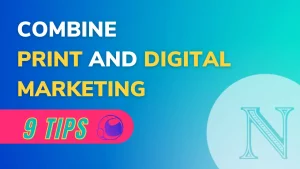If you’ve taken the first step to start learning programming, that’s great.Once you’ve taken advantage of most, if not all, of the free online resources available to help you kickstart your learning journey, you’re probably going to start wondering what’s next.
Read also: Learn to code – Starting guide to learn coding for beginners
This is especially if you intend to get your programming basics down and learn to write more complicated code (and solve real-world problems).Sure, you could teach yourself coding – just like the many self-taught programmers out there (like our founder Josh Teng!) – but for most people, they end up getting themselves into some kind of formal learning environment such as a college/ university for a computer science degree… or a coding bootcamp.Why? Well, because there will come a point where you will run out of resources and/or motivation to keep coding, especially when you feel lost or have no idea how to solve a problem.Thankfully, both these options offer you guidance and assistance in the form of mentors/ teachers and classes/ lectures which can help you get over any speed bump you find yourself facing along the way.Also, both routes are effective stepping stones to kick-starting a career in software development.So, if you’re torn between choosing to go for a computer science degree or attending a coding bootcamp, you’ll want to read the rest of this article – we’re here to help choose the right option for YOU (and not just give you reasons why you should do a CS degree or a coding bootcamp)!Here’s a brief rundown of the points we’ll be covering:
1. A (brief) history of computer science degrees and coding bootcamps
2. The pros and cons of both options, namely the differences in:
- Time (course duration)
- Cost
- Syllabus
- Teaching method
- Learning environment
- Course objectives
- Opportunities
3. Post-graduation: The job market and (eventual) career progression4. Alternative choices
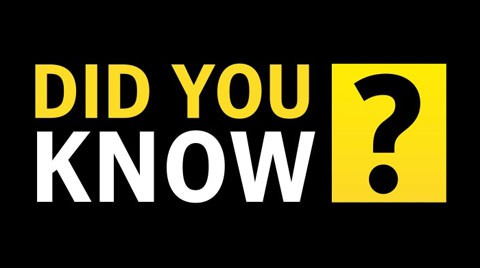
A (brief) history of computer science degrees and coding bootcamps
There is just no denying that software is eating the world, and as a result, there is an “insatiable appetite” for technical talent.But in trying to fill that gap, which route should you go for?Before we get to the coding bootcamps vs computer science degree showdown, it would be fair to consider where did it all begin.For computer science degrees:Many believed that it would be impossible for computers themselves to be a scientific field of study, but it gradually became accepted among the academic population in the late fifties.
- In 1953, the world’s first computer science degree program – the Cambridge Diploma in Computer Science – began at the University of Cambridge Computer Laboratory.
- In 1962, the first computer science degree program was introduced in the United States at Purdue University.
- Nearly every major public university or private college throughout the world has some form of computer science education. In the US alone, around 50,000 people graduate with a CS degree each year.
- However, the number of students pursuing computer science (or STEM subjects in general) in institutions of higher learning have stagnated.
As for coding bootcamps:
- In recent years, the popularity of coding bootcamps have *exploded*.
- At the end of 2011, one person posted an offer on Hacker News to teach 6 people to code.
- Then, a company offered a 5-month free developer training program with a job guarantee for those who successfully made it through.
- Since then, there have been more and more coding bootcamps. This year (2016), the sheer number of bootcamp providers in the US is now 91. This is without taking into account the number of providers throughout the world.
- The coding bootcamp industry produces approximately 6,000 software developers per year – and it’s growing.

The pros and cons
Now, let’s get down to business. But, instead of defeating the Huns (yes, that’s a Mulan reference), we’re going to help you break down the pros and cons of both computer science degrees as well as coding bootcamps. Here are some questions you should already start asking yourself right now:

How much time do I have?
A better question you should be asking is: how much time are you willing to spend? Here’s a breakdown of the average time span of both coding bootcamps and computer science degrees.
Average duration of coding bootcamps: 9 to 12 weeks (2-3 months)
Average duration of CS degrees: 4 years
What bootcamps lack in duration, they perhaps make up in intensity. On average, coding bootcamp students spend at least 8 hours a day, five days a week in class for between two to three months. This doesn’t take into account the time they spend after class or on weekends brushing up on their coding know-how.
Still, the difference between 2-3 months (barely even a semester in college) and 4 years is pretty big, so you should definitely think it through before jumping into something like a computer science degree which requires a fair bit of commitment, time-wise.
However, it is worth mentioning that investing your time into something incredibly rewarding like a CS degree is also something worth considering if it fits your learning goals (ie: if you intend to be a computer scientist).

How much am I willing to spend?
The appeal of coding bootcamps is that in the grand scheme of things, they’re a cheaper alternative. To be fair, they cost much, much less than an entire four-year computer science degree.
Average cost of coding bootcamps: Between RM10,000 – RM40,000
Average cost of four-year CS degree: Between RM60,000 at a local college to over USD$ 250,000 at a prestigious university overseas (approximately RM1mil)
Average cost of a semester: Anywhere between RM8,000 – USD$10,000 (approximately RM40,000)
Note: Malaysian public universities have outrageously low course fees (under RM10,000 for a four-year course), but seeing as how they only accept traditional students – as in those who come right out of a pre-university program such as local matriculation or Form Six, we’re not taking that into account.
On average, a four-year CS degree at a private institution of higher learning in Malaysia will cost around RM60,000 at least. And, if you choose to study in a top university abroad, be prepared to fork out around RM1mil just for your course fees.
Meanwhile, a bootcamp will cost you anywhere between RM10,000 and USD$10,000 on average, which is even cheaper or almost equivalent to a single semester of that same degree.
Clearly, it costs a lot more to attend university, so it would not be a level playing field if we just made a direct comparison. This is why we should bear in mind opportunity cost – which takes into account the amount of money which was “lost” as a result of the longer duration of a CS degree.
While college or university graduates with a degree in computer science may be able to demand a higher starting pay than someone who merely attended a bootcamp, they’re not not going to make any money out of it nor will they be gaining any real-world job experience.
Meanwhile, a coding bootcamp graduate will be working for an average of 2-3 years more than a CS degree graduate (assuming they both started their course at the same time). Any perceived disadvantage a bootcamp graduate has is negated by their time advantage!
So, if you’ve just been retrenched or are looking to change jobs, or if you’re on a tight budget, a coding bootcamp may be a better alternative for you because the expenditure would cover the duration of the short course, after which you can start looking jobs or working on freelance projects.
However, in the end, whether or not you have the money to blow on a CS degree or a coding bootcamp is not as important as getting your money’s worth – or, as they say, a bang for your buck – in your learning journey.
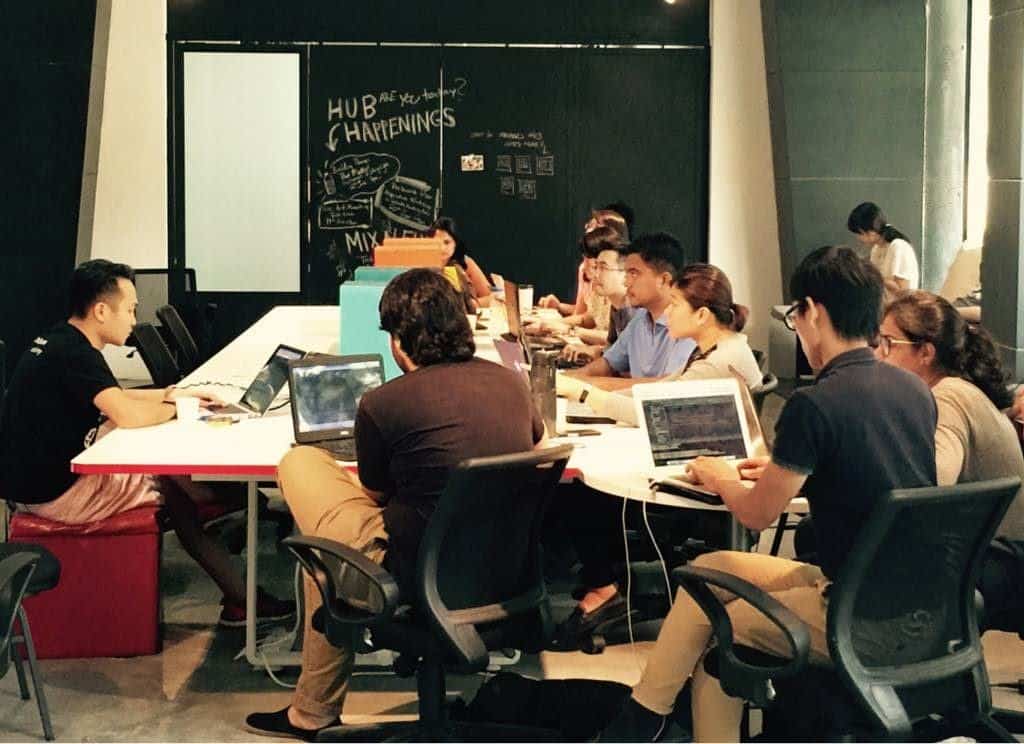
What can I expect to learn, and how can I learn most effectively?
The typical college experience varies greatly from what you’d experience at a coding bootcamp. So, before enrolling in either course, you should assess which learning method you’d benefit from the most. For example, do you learn best from a show-and-tell method, or would you prefer to have the theory down before you start putting things into practice?
Here’s a neat table with the general overview of the features of a CS degree and a coding bootcamp.
Note: Some CS degrees and coding bootcamps may have different curriculum or learning approaches, so you should definitely do in-depth research on your university/college or bootcamp of choice before signing yourself up!
Subjects
Computer Science degree
- Only about a handful of the classes you take will involve actual programming
- Usually focused on programming in Java and C++, Operating System Design, Computer Science Theory, Advanced Mathematics and Algorithms
- You will also have subjects like the non-pertinent MPU subjects in Malaysia (such as Ethics and Moral or English).
Coding bootcamp
- Intense focus on programming, understanding front-end and back-end development
- Usually focused on Ruby, Rails, Python, Flask, React, HTML, CSS, Bootstrap, Javascript, Github and APIs
Environment
Computer Science degree
- Lectures are typically for one-way learning (where the lecturer delivers the subject matter) followed by tutorials where students have to put what they’ve learnt into use
- Learning is done at a reasonable pace (over four years), and most of the subjects are only touching on the surface to introduce students to the different languages/concepts out there in the real world.
- There is an extensive use of learning aids, as in programming is usually done in an integrated development environment (IDE) which will point out any mistakes to students codes before it can “compile”.
- If any, lectures are more of a show-and-tell where the instructors demonstrate how a problem can be solved.
Coding bootcamp
- It is very intense (due to the short timeframe and large volume of subject matter to cover).
- Students are typically “thrown into the deep end” by having to complete certain challenges or milestones everyday, thereby forcing them to immediately put into practice what they’ve learnt or read about.
- Instructors are around to conduct code reviews (where they go through your code to see if there’s anything which can be simplified or improved on)
Assessments
Computer Science degree
- Scheduled assessments such as class quizzes, coursework and midterm or final exams can be expected.
Coding bootcamp
- Varies from bootcamp to bootcamp – typically, there are occasional “checkpoints” to allow the instructors to gauge how a student is progressing.
Class size
Computer Science degree
- Varies between 30 (small classes) to hundreds of students (large lectures)
Coding bootcamp
- Instructor to student ratio is typically kept at 1:10
In essence, if you’re looking for a challenging programming-oriented learning experience with a small class size, a coding bootcamp would be a top choice. Alternatively, you might want to pursue a CS degree if you’re hoping to experience a traditional learning experience with a heavy emphasis on theoretical knowledge (which will form your foundation as a software developer).
Also, see this helpful chart:
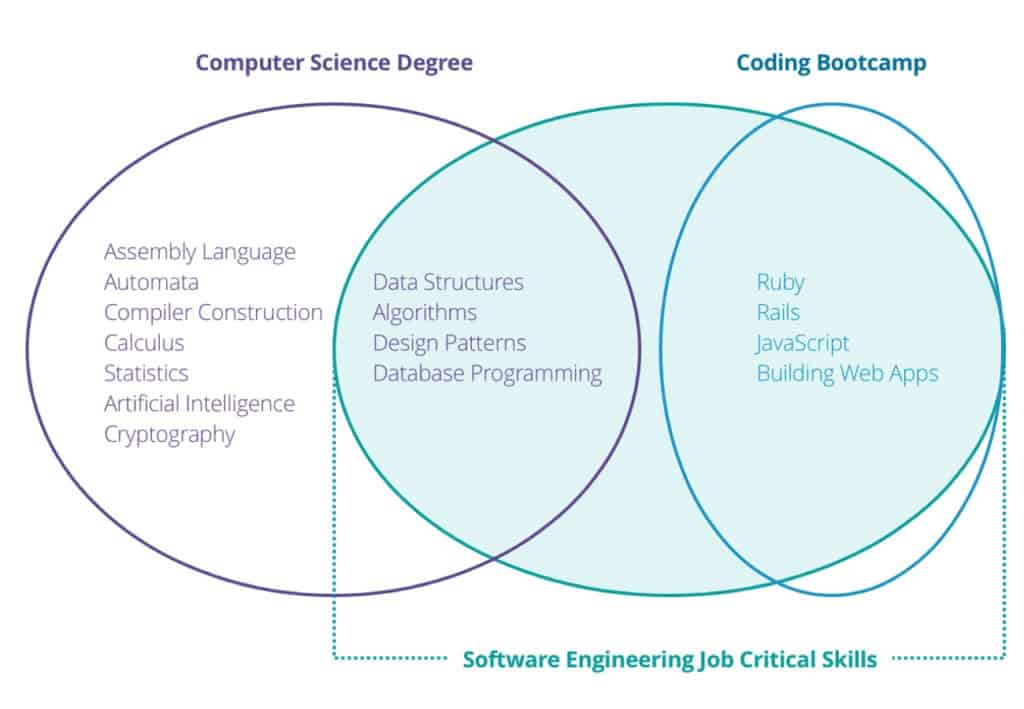
Another point of consideration would be what you expect to do after the course, which brings us to…
Post-graduation opportunities
Obviously, one key factor which can influence your decision is what kind of career opportunities are available to you once you complete your course – be it computer science degree or coding bootcamps. It is probably good to note that both CS degrees and coding bootcamps are “effective ways to land a job as a programmer”. But, learning to program is something you learn by doing, and some of the best programmers don’t have a degree from a university in computer science.

What are my options after the course?
The obvious answer would be to get a well-paying job, but the question would be: what kind of job are you looking for?
- Would you be more interested in the knowledge behind computer science, studying the theoretical foundations of information and computation as well as its application? Or,
- are you more of a doer – meaning that you’d much rather be building (sometimes very, very cool) stuff or solving problems?
If your choice was 1), you’d probably be interested in a career as a computer scientist or something along those lines – an indication that you’re leaning towards a CS degree.
However, the reality is this: you are not a programmer just by virtue of having a CS degree. In fact, you are a computer scientist, who is a programmer by necessity and not nature.
Conversely, option 2) indicates that you’re more interested in being a programmer or software developer – meaning you’d likely benefit more from a stint at a coding bootcamp, where you’ll learn how to program.
One key point to consider is that a person with a CS degree has a larger range of career options. This simple example shows it perfectly well:
- A CS degree holder can be a computer scientist or (learn to be a) programmer.
- A bootcamp graduate can be a programmer, but not a computer scientist – not without a degree in it..

How much will my salary be?
There is no denying that CS degree graduates are able to demand a higher starting pay than a coding bootcamp graduate on virtue of their paper qualification. That may be the case for now – but the shift (as shown above) is happening, which means that it won’t be the case for much longer.
So, you can say that having a degree in your hands is really not the most important thing.In simpler terms, here are some facts we’ll be using in our calculations:
- It takes an average of 3 to 9 months for fresh graduates to find a job.
- The average starting salary of a CS degree graduate is estimated to be around USD $45,000 – 106,000.
- Meanwhile, the average starting salary of a coding bootcamp graduate is around $75,000 – 80,000.
- Typically, employees can expect an average salary increment of around 3% per year.
Let’s assume Person A is starting a CS degree and Person B just enrolled in a coding bootcamp. For our example, we’ll be using the median of all these average values for simplicity’s sake.
In 10 years:
- Person A would have been working for 6 years. With a starting salary of USD $75,500 and a raise of 3% every year, they would have earned approximately USD $500,000.
- Person B would have been working for about 9 years. With a starting salary of USD $77,500 and a raise of 3% every year, they would have earned approximately USD $800,000.
Simply put, having a CS degree doesn’t mean you’ll end up getting paid much more.
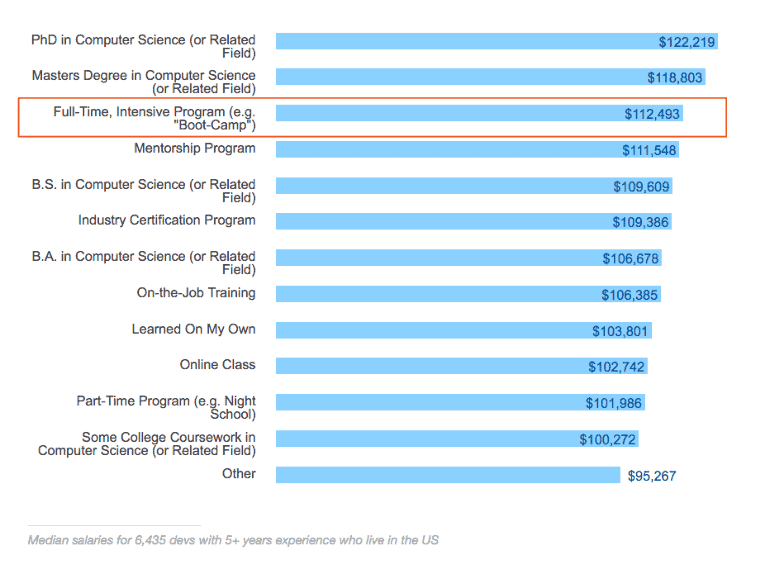
Okay, but what are the job prospects in the industry when I graduate? Will there be demand for graduates like me?
While there are definitely more computer science graduates (and more coding bootcamp graduates) than there were five years ago, it’s definitely not enough. The reason? It still does not meet the demand of today’s employers.
Some other key facts to consider:
- The U.S. Bureau of Labor Statistics predicts that by the year 2020, there will be 1 million more jobs than computer science degree students. To put that into perspective, that’s just four years away.
- This is just proof that there will most definitely be demand for graduates like you – whether you choose to go for a coding bootcamp or a computer science degree!
- Bootcamps are the trade schools for the digital age. It is a promising fast-track to a career in coding with a heavy emphasis on hands-on training, career guidance and community support as well as the opportunity to work on projects which you can showcase to potential employers. However, being a bootcamp graduate shouldn’t be your biggest selling point for potential employers, as some hiring companies still prefer to hire degree-holders.
- BUT, while there have been more students who took up computer science courses than students in physics, chemistry and maths combined in the last six years, computer science has consistently recorded the highest rate of unemployed graduates. This could be an indication that CS degrees don’t exactly equip its graduates with the right (or rather, most current) skills for today’s job market.
Ultimately – the job prospects are pretty great, and there will always be a demand for competent software developers who strive to stay consistent, regardless of their chosen method to learn programming.

What will my career progression be like?
At this point in the article, if you still haven’t gotten around to a decision, you need to evaluate your career goals – which, 20 to 30 years from now, are just as important (if not more) to consider as the cost and curriculum.
Getting a job is just the first step to a hundred-foot journey that is your career. As such, it is worth thinking about what kind of career progression you’re looking for.
You will most likely need a computer science degree if your #lifegoal is to be the VP of Engineering at a major corporation like Apple, Amazon or Google.
To any HR executive who goes through your CV, having a degree under your belt makes a lot more sense (and is more proof of your skillset) than perhaps a certificate from a coding bootcamp or a Codecademy profile complete with badges or a Github repository full of open source projects you’ve worked on.
Some might argue that it’s not impossible to get a job at a top corporation without a CS degree, but be prepared to prove your skills to HR. Also, they’d be the exception, not the norm.
But, if you’re simply thinking about joining a startup or even launching one of your own, a coding bootcamp is a much better choice.
First of all, your personal projects and motivation to learn (mostly on your own) are a good sign that you have the drive to succeed, which is a trait highly valued in a startup.
Also, if your plan is launching your own startup, all you’ll need are the coding skills (which you’ve picked up at bootcamp!) to build your app or website.
Alternative choices
After weighing the pros and cons of both options, you might begin to wonder – can coding bootcamps replace a computer science degree?
The answer: No.
Coding bootcamps are not a solid replacement for the rigour of a traditional computer science degree. Bootcamp programs, on the other hand, offer something that is definitely lacking in most computer science courses: hands-on experience.
So, combining the best of both worlds – that is, understanding how a computer works (and therefore, being better at working with computers) as well as the practical skills – will give you a leg up when you start looking for jobs.
Need proof? No worries, we’ve got it covered.
Below are the results of an analysis by Triplebyte, a tech recruiting startup that doesn’t look at resumes but instead performs blind technical screenings of software engineers before potentially placing them at companies such as Dropbox and Stripe.
The analysis was done over 100 bootcamp grads and 150 college/ university computer science grads. And the results show that both courses prepare students with a different skillset.Here is a graph of Triplebyte’s results:
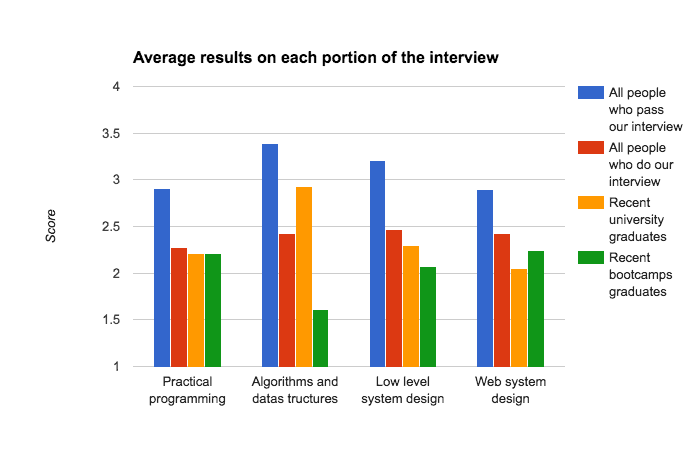
In fewer words, why not both?
The fact is, a standard four-year education institution is not only costly, but they are also hard-pressed to keep up with the demand of the ever-evolving web development industry. As such, they rely on building basic computer logic, which is fundamental in equipping students with the essential technical know-how to allow them to go out and quickly pick up on whatever new language or framework the industry is using.
There are also more bootcamp students out there, so you’re really not alone.
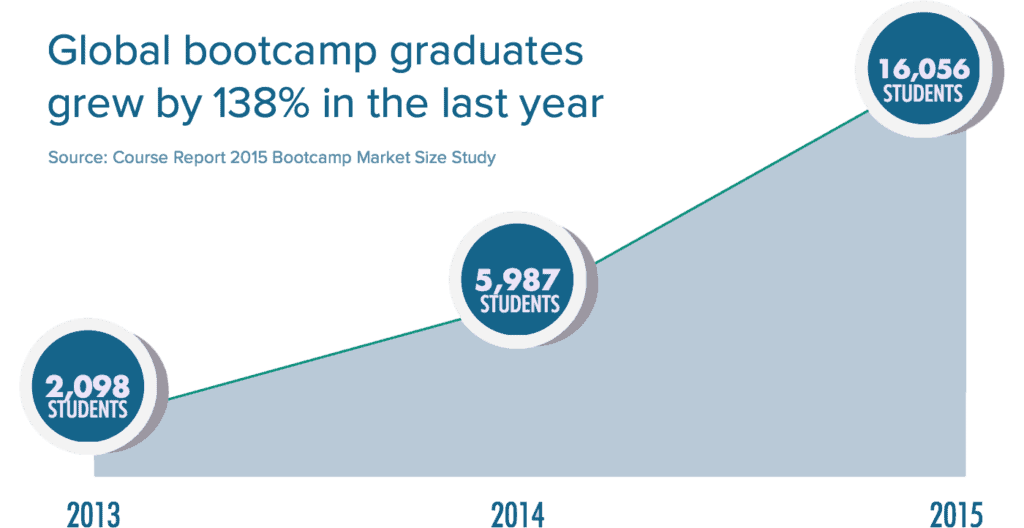
However, bootcamps don’t always have the time to prepare their graduates with such fundamental logic – which is why you’ll benefit the most from having the practical skills which coding bootcamps emphasise on as well as the in-depth theoretical knowledge that computer science degrees cover.
In making your decision, if you find that time is on your side and you can afford to go for both options, you definitely should.
Else, programming bootcamp can be a fast track for you to transit your career to be a programmer with strong technical skills equipped from it, but do not forget to pick up some fundamentals on the side for better future career progression.
Check out our Web Development Bootcamp or the Front-End Web Development Course today!
-
Josh Tenghttps://www.nextacademy.com/author/josh/
-
Josh Tenghttps://www.nextacademy.com/author/josh/
-
Josh Tenghttps://www.nextacademy.com/author/josh/
-
Josh Tenghttps://www.nextacademy.com/author/josh/
 What We Have Done |
What We Have Done | 
